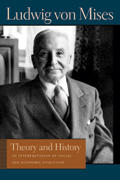Teoria e História

Uma leitura não particularmente leve mas fortemente recomendada, tanto a economistas e historiadores como a interessados pelas ciências sociais em geral: Theory and History: An Interpretation of Social and Economic Evolution, de Ludwig von Mises.Theory and History is primarily a critique of Karl Marx, his materialism, and his prediction of the inevitability of socialism. Marx attributes the creation of tools and machines, as well as the economic structure of society, to undefined “material productive forces;” Mises rejects this materialistic view; he points out that tools and machines are actually created by individuals acting on the basis of non-materialistic ideas.
This book discusses the theory of economics, i.e., the study of purposive human action, and with history, the record of the past actions of individuals. All actions are determined by ideas. Thoughts and ideas are “real things,” Mises writes. “Although intangible and immaterial, they are factors in bringing about changes in the realm, of tangible and material things.” Rather than rejecting the study of historical change as a “useless pastime,” Mises considers it of the utmost practical importance. “History looks backward into the past, but the lesson it teaches concerns things to come.” History opens the mind to an understanding of human nature, increases wisdom, and distinguishes civilized man from the barbarian. Moreover, historical knowledge is of the utmost importance in helping to anticipate and plan for the future.
Though Theory and History may not be studied as often as other, more popular Mises works, it provides great insight into Mises’s fundamental thoughts and is a fascinating exploration of human action.
por André Azevedo Alves @ 9/27/2005 11:17:00 p.m.
![]()

<< Blogue